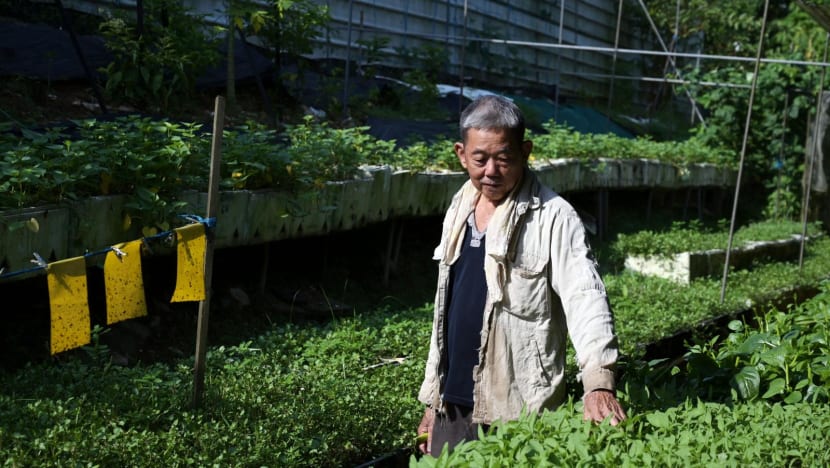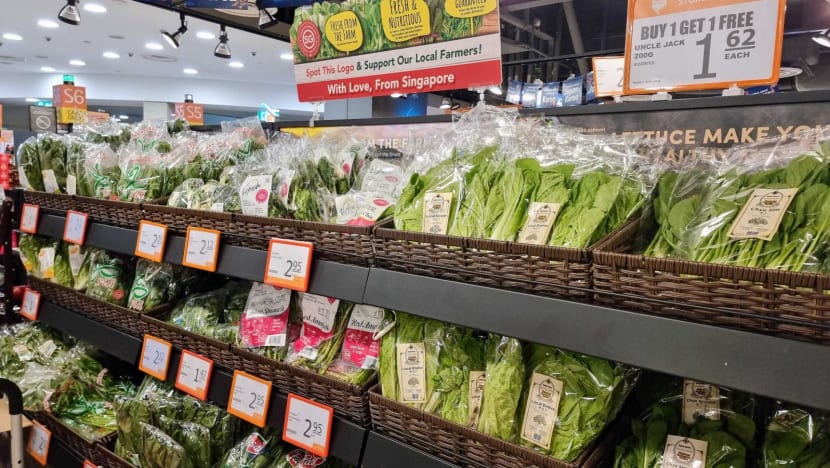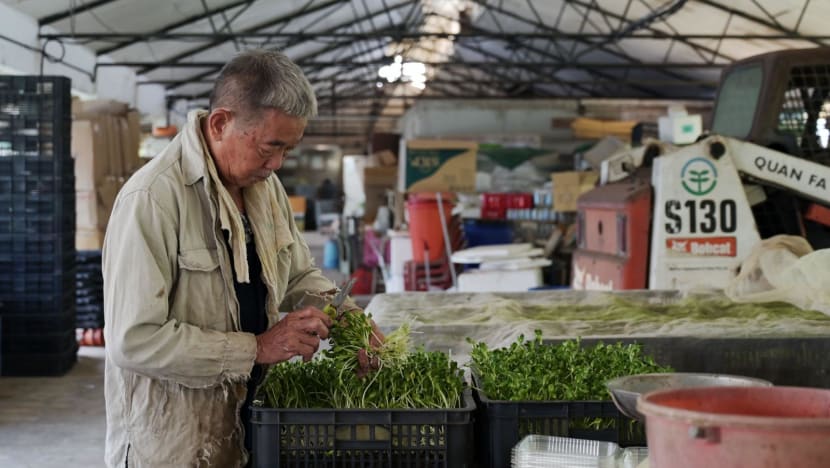Support local or buy global: Will Singaporeans embrace local produce despite higher prices?
Local produce usually costs about 30 per cent more than imports. Although they can't compete on price, there are advantages to buying local, farmers tell CNA.

Liao Chuan Huat, founder of Quan Fa Organic Farm, walks through his farm while checking on his sprouts. (Photo: CNA/Marcus Mark Ramos)
SINGAPORE: Even as Singapore aims to produce more of its own food, farmers are questioning if there is sufficient demand for locally grown crops.
Singapore consumers are spoilt for choice when it comes to produce, with the country currently importing 90 per cent of its food. With limited farmland, high labour costs and energy prices soaring, local vegetables cost more to grow and tend to be priced about 30 per cent higher than imported greens.
Farms are scaling up and increasing production post-COVID. But are consumers ready to buy local?
“That's the million-dollar question that the whole industry is trying to figure out, including the government,” said Mr Ong Kai Hian, executive director of local farm Meod.
Farmers CNA talked to did not think that local vegetables would be able to match the prices of imported vegetables even if production goes up.
Rather, building the capacity to grow vegetables here is an investment for the long term, as the global food supply becomes more precarious due to climate change.
During the debate on the President’s Address in April, Minister for Sustainability and the Environment Grace Fu said climate change, geopolitical tensions and disease outbreaks will place pressure on Singapore’s food sources.
Singapore aims to have the capability and capacity to produce 30 per cent of the country’s nutritional needs locally by 2030. Upcoming infrastructure developments like the Lim Chu Kang Masterplan are touted to transform Lim Chu Kang into a high-tech agrifood cluster.
“This is about buying insurance against systemic food supply disruption, so that future generations are in a better place with food security,” Ms Fu had said, urging consumers to support local farms and F&B businesses that use local produce.
“Local produce may cost more but is more reliable and fresh ... by building up our local food production today, we are gaining food security for tomorrow.”
BOOSTING DEMAND
In February, an industry-led alliance supported by the Singapore Food Agency (SFA) was set up to boost demand for local produce through consumer education.
The agency also rolled out the bright red “SG Fresh Produce” logo in 2020 to make it easier for consumers to identify and buy local produce while grocery shopping.
Retailers are encouraged to carry more local produce, and the SFA has partnered FairPrice to support four local farms to sell their Asian leafy greens and potted vegetables. The supermarket operator also guided the farms in fine-tuning their products, pricing and promotion mechanics.

Local greens are also available online, with RedMart saying that sales of these vegetables went up during the pandemic, and have stayed higher than before COVID-19. The online grocer carries 30 different types of locally grown vegetables from 29 farms.
A Farm-to-Table programme also recognises hotels, restaurants and catering businesses that support local produce.
One restaurant in the programme is Gardenasia (The Local Farm), a bistro that sources much of its ingredients from local farms.
“If people don't buy local, the farmers have no incentive to grow more,” said director Kenny Eng, who has turned local produce into ready-to-eat products like gelato and soups.
“The ecosystem is not robust enough yet, we can’t rush this … we need to continue to innovate and continue to drive demand.”
BUILDING CAPACITY
Just 3.9 per cent of vegetables consumed here last year were locally grown, the Singapore Food Statistics report released last month said. This is down from 4.3 per cent the previous year.
In the last few years, some farms have closed or moved, while new ones faced significant delays setting up or expanding due to the COVID-19 pandemic.

One farm that had to scale down is Quan Fa Organic Farm. After failing to secure agricultural land in government tenders a few years ago, the farm started up in Cameron Highlands instead. Quan Fa also partners farms in Malaysia and Thailand to grow crops to its specifications, which are then shipped to Singapore for sale.
It moved to Kranji – taking up a much smaller site – after partnering with another farm. This is why more than 90 per cent of its organic produce now comes from neighbouring countries.
Mr Liao Chuan Huat, who founded the farm, said he has moved four times since 1979, as land leases expired.
Meanwhile, new farm Livfresh wanted to produce 1,000 tonnes of fresh produce annually by this year, but with construction delays due to the pandemic, its plans were delayed by about 18 months.
While Livfresh has been selling its produce in supermarkets here since August last year, the farm's current production is just a quarter of what was planned.
“The old capacity is gone and the new capacity has not come up fast enough. So that's the situation today,” said founder and CEO Karthik Rajan of the agricultural sector in Singapore.
Farms here are also dealing with rising material and energy costs since Russia invaded Ukraine.
“There were times when the electricity rates were so high that the more we grew, the more the company lost,” said Mr Lee Yuan Hao of GKE Agritech.
PRICE A "BOTTLENECK"
Despite these challenges, local farms and experts CNA spoke to said it is imperative Singapore builds up the capacity to grow its own food.
The country has to be ready as food prices will rise in the long run and supply will be disrupted by climate change, they said.
Price is the "bottleneck" for consumers when it comes to buying local over imported, said Nanyang Technological University's (NTU) Professor William Chen.
But this may not be the case for long. With global warming and extreme weather events on the rise, the yield of imported vegetables – grown on traditional weather-dependent farms – will decline.
This will lead to price hikes or even a shortage of vegetables that can be imported into Singapore, said Prof Chen, the director of NTU's food science and technology programme.
“It is important that we show support for our local farms, keep them in the business and make locally produced vegetables as a viable option for our own benefit.”
Farms here may not be able to compete with imports on price, but there are advantages to buying local, Meod's Mr Ong said.
“In Singapore, we have a more sustainable way of growing our produce. We are mindful of electrical consumption, water consumption, chemical usage, and we are pesticide-free. These are all the standards that local firms are trying to apply to have a differentiated product from imports,” he said.
The other factor is freshness, he said. “Generally we harvest on the same day and deliver within the same day … the produce is of better quality and lasts longer, and it tastes better.”
BANDING TOGETHER
With local farms already struggling with high manpower and energy costs, they would not be able to lower their prices to match those of cheap imports, said Ms Nichol Ng, CEO of FoodXervices, which supplies goods to F&B businesses.
“I continuously see many more farms shutting their doors in the last two, three years. Even those that are surviving, maybe the slightly larger ones or the ones that are well-funded, they are also finding it difficult to maintain the operations,” said Ms Ng, a vocal advocate for local produce.
But she thinks that as sustainability becomes more important for businesses and consumers, they will start to see the value in having food supplies from local sources with a lower carbon footprint.
A few interviewees said one way to boost demand was to have orders from large organisations such as major hotel chains, SATS or the armed forces.
Another way forward is to promote more cooperation among local farm players, said Ms Ng. “When you look at Australia or even in France, for example – they have this co-op mentality … They will band together to ensure that they survive, but in Singapore we have not managed to achieve that yet.”
Some farms like Livfresh are in favour of this.
“I think that's a missing link today. The way I view it is we're all in this together competing with imports rather than competing with each other,” said Mr Rajan.
This article was originally published on Channel NewsAsia.


No comments
Share your thoughts! Tell us your name and class for a gift (: